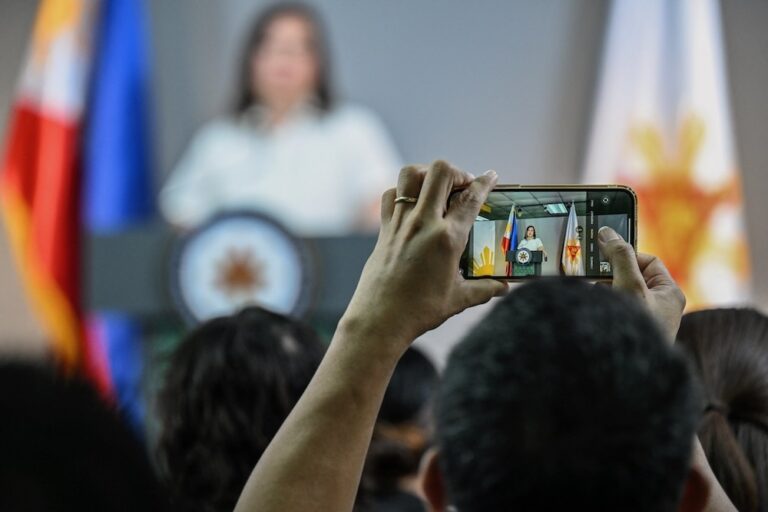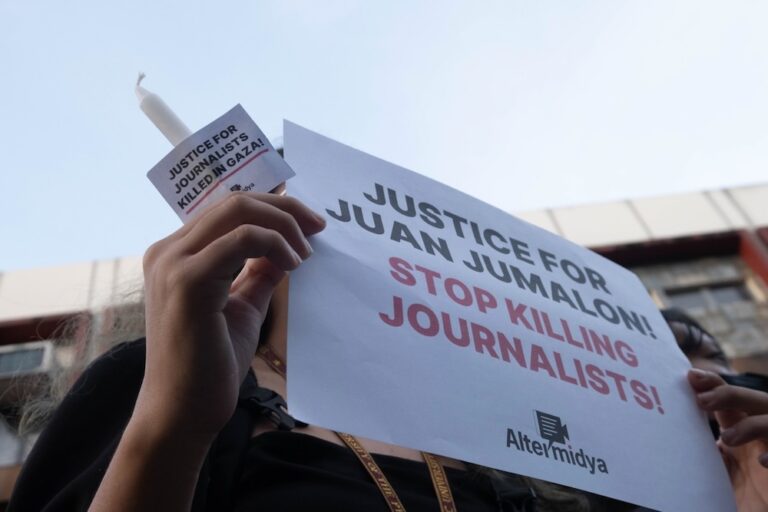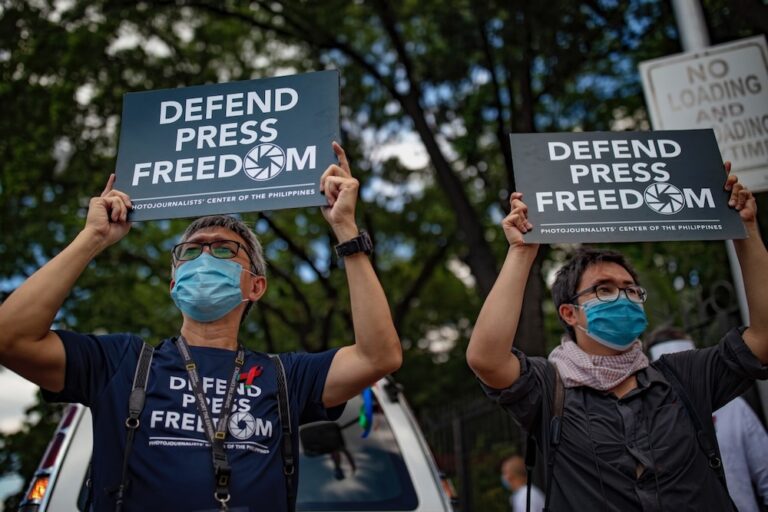(CMFR/IFEX) – The Justice Secretary of the Philippines told reporters on 4 July 2007 that through the country’s Anti-terror law, which could take effect on 15 July, the media may be wiretapped based on mere suspicion of involvement in terrorism. “If you are a journalist, you are free from wiretapping because the law says that […]
(CMFR/IFEX) – The Justice Secretary of the Philippines told reporters on 4 July 2007 that through the country’s Anti-terror law, which could take effect on 15 July, the media may be wiretapped based on mere suspicion of involvement in terrorism.
“If you are a journalist, you are free from wiretapping because the law says that journalists and their sources of information cannot be subjected to wiretapping. The fact that your source is a terrorist does not make you a terrorist per se,” Justice Secretary Raul Gonzalez said, Inquirer.net reported.
“But if the journalist is now a suspect, then he can be wiretapped. You have to be first a suspect,” Gonzalez said, adding that a person may be considered a terror suspect if he is “contaminated.”
“For example, there is suspicion against you. You are now part of the group that is planning to terrorise, to do harm to the state,” Gonzalez said.
“Nobody is immune to the possibility of wiretapping, but [having one’s phone wiretapped] must be predicated on the fact that he is a suspect,” he said.
Gonzalez also said that wiretapping was “intrusive,” but that freedom was not absolute.
Gonzalez, however, stressed that approval of the Court of Appeals was needed before anyone could be bugged under Republic Act 9371, or the Anti-terror law. The law is also called the Human Security Act (HSA) of 2007 and “An Act to Secure the State and Protect our People from Terrorism.”
HSA was signed into law in Malacañang, where the Philippine President holds office, on 6 March 2007 in the presence not only of the leaders of Congress and the bill’s sponsors but also diplomats from 17 countries, including the United States and Australia. Six days later, Martin Scheinin, United Nations Special Rapporteur for Human Rights and Counter Terrorism, issued a statement saying that “many provisions of the Human Security Act are not in accordance with international human rights standards.” He then urged the Philippine government to amend, if not repeal, the law.
Bayan Muna (People First) Representative Teodoro Casiño has asked Arroyo to suspend indefinitely the law’s implementation while opposition Senator Maria Ana Consuelo “Jamby” Madrigal is seeking the repeal of what she described as “the most dangerous piece of legislation passed by the Philippine Congress,” Inquirer.net reported.
Casiño said that Congress should be given time to review and repeal the law, saying “the anti-terror law, deceivingly labelled the Human Security Act, is like a loaded gun to be given to a homicidal maniac who does not respect the rule of law or international human rights standards.”
Madrigal meanwhile said that the law is “replete with provisions that ravage constitutional guarantees.”
“This draconian law should be shredded to pieces and thrown into the garbage bin. The use of violence against civilians under any guise should be opposed. National security should not be used as an excuse to stifle basic freedoms and constitutionally-guaranteed human rights,” the senator said in a bill she filed for the repeal of the anti-terror law.
However, after the law was passed, Arroyo said that “law-abiding Filipinos” have no reason to fear HSA “for it is a weapon that shall be wielded against bombers and not protesters.”
Deputy National Security Adviser Pedro Cabuay also defended the law.
“The Human Security Act is a good law. We’re happy about it, although it has a lot of safeguards. These are aimed at protecting the people,” he said.
HSA identifies the crime of terrorism to include: piracy in general and mutiny on the high seas, rebellion or insurrection, coup d’état, murder, kidnapping and serious illegal detention, crimes involving destruction, arson, hijacking, highway robbery, and illegal and unlawful possession, manufacture, dealing in, acquisition or disposition of firearms, ammunition or explosives. Any person may be labelled a terrorist if he committed such acts “thereby sowing and creating a condition of widespread and extraordinary fear and panic among the populace, in order to coerce the government to give in to an unlawful demand.”
Persons found guilty of terrorism so defined will be imprisoned for 40 years without parole.
Section 19 of the law states that “in the event of an actual or imminent terrorist attack, suspects may not be detained for more than three days without the written approval of a municipal city, provincial or regional official of the Human Rights Commission or judge of the municipal, regional trial court, the Sandiganbayan or a justice of the Court of Appeals.”
Under Section 39 of the law, the assets of any person, suspected or charged, could be sequestered or frozen. In cases however where the evidence of guilt is not strong, the person charged is entitled to bail, but travel outside his municipality, without the authorisation of the court, shall be deemed a violation of the terms and conditions of his bail. He/she may also be placed under house arrest, during which “he or she may not use telephones, cell phones, e-mails, computers, the internet or other means of communication with people outside the residence until otherwise ordered by the court.”
Gonzalez said the law could be implemented by about August or September. Executive Secretary Eduardo Ermita, however, said that the anti-terrorism council was working to complete all requisites to ensure the measure would be in force by 15 July.


